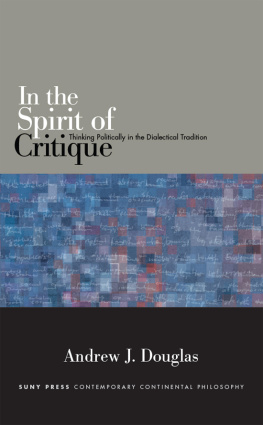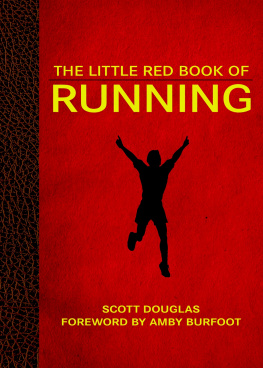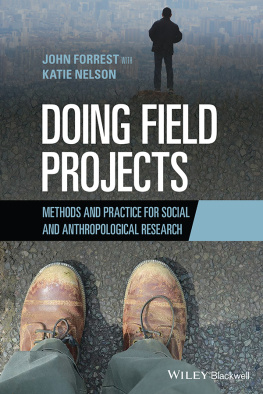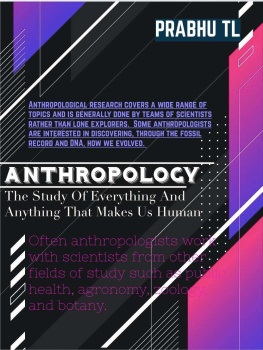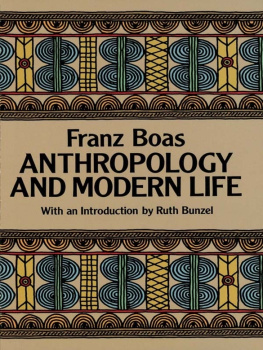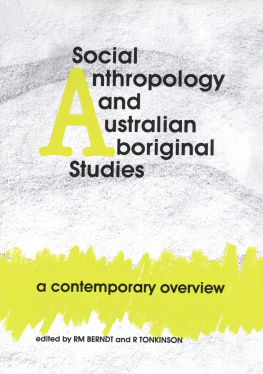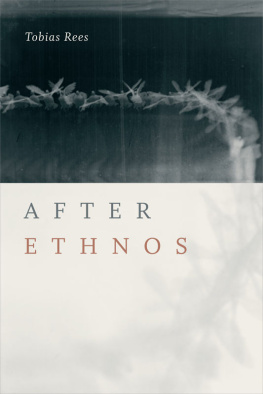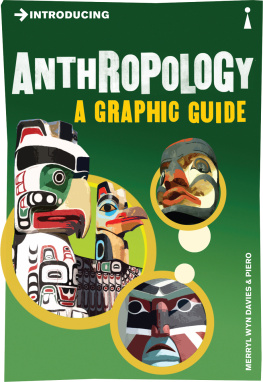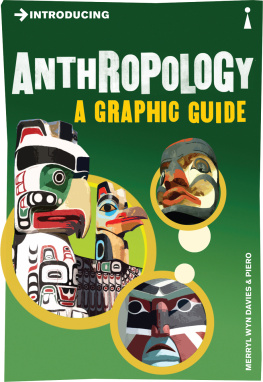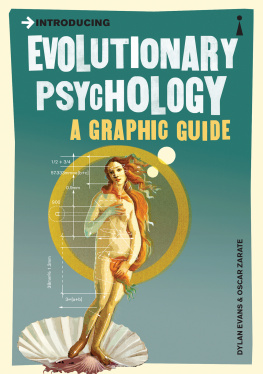
MARY DOUGLAS
MARY DOUGLAS: COLLECTED WORKS
VOLUME I
The Lele of the Kasai
VOLUME II
Purity and Danger
VOLUME III
Natural Symbols
VOLUME IV
Rules and Meanings
VOLUME V
Implicit Meanings
VOLUME VI
The World of Goods
VOLUME VII
Edward Evans-Pritchard
VOLUME VIII
Essays in the Sociology of Perception
VOLUME IX
Food in the Social Order
VOLUME X
Constructive Drinking
VOLUME XI
Risk Acceptability According to the Social Sciences
VOLUME XII
Risk and Blame
MARY DOUGLAS COLLECTED WORKS
VOLUME IX
FOOD IN THE SOCIAL ORDER
Studies of Food and Festivities in Three American Communities

First published in 1973 by Routledge
This edition published 2003
by Routledge
2 Park Square, Milton Park, Abingdon, Oxon, OX14 4RN
Simultaneously published in the USA and Canada
by Routledge
270 Madison Ave, New York NY 10016
Routledge is an imprint of the Taylor & Francis Group
Transferred to Digital Printing 2009
1984 by the Russell Sage Foundation
Typeset in Times by
Keystroke, Jacaranda Lodge, Wolverhampton
All rights reserved. No part of this hook may he reprinted or reproduced or utilised in any form or by any electronic, mechanical, or other means, now known or hereafter invented, including photocopying and recording. or in any information storage or retrieval system, without permission in writing from the publishers.
British Library Cataloguing in Publication Data
A catalogue record for this book is available from the British Library
Library of Congress Cataloging in Publication Data
ISBN 0415283973 (set)
ISBN10: 0415291127 (hbk)
ISBN10: 0415488524 (pbk)
ISBN13: 9780415291125 (hbk)
ISBN13: 9780415488525 (pbk)
Publishers Note
The publisher has gone to great lengths to ensure the quality of this reprint but points out that some imperfections in the original may be apparent.
This volume is dedicated to Audrey Richards and Margaret Mead for their pioneering work on food habits.
Contents
MARY DOUGLAS
WILLIAM K. POWERS
MARLA M.N. POWERS
TONY LARRY WHITEHEAD
JUDITH G. GOODE
KAREN CURTIS
JANET THEOPHANO
JONATHAN L. GROSS
Contributors
MARY DOUGLAS holds the Avalon Foundation chair in the humanities at Northwestern University, where she teaches in the departments of Anthropology and History and Literature of Religion. Several earlier essays on food behavior and food meanings can be found in a recent collection of her work, In the Active Voice. In 1984, she presented four lectures at the Ecole Practique des Hautes Etudes, University of Paris, on symbolism in modern society, with specific reference to the case of food.

WILLIAM K. POWERS is professor and former chair of the Department of Anthropology at Rutgers University, New Brunswick, New Jersey. He received his B.A. from Brooklyn College, CUNY, in 1970; M.A. from Wesleyan University in 1971; and Ph.D. from the University of Pennsylvania in 1975. His writings include Oglala Religion (1977) and Yuwipi: Vision and Experience in Oglala Ritual (1982), both published by the University of Nebraska Press.
MARLA N. POWERS is a visiting research associate at the Institute for Research on Women, Rutgers University. She received her B.A. from Brooklyn College, CUNY, in 1971, and her M.A. and Ph.D. from Rutgers University in 1982. Her published works include Menstruation and Reproduction: An Oglala Case, which appeared in Signs, 1980.
The Powerses have collaborated on research at Pine Ridge, South Dakota, for 27 years and are presently writing a number of books and articles on Oglala kinship and marriage, images of American Indian women, sexual symbolism in the Sun dance, Lakota foods, music, and dance.

JUDITH GOODE is chairperson of the Department of Anthropology at Temple University. As an urban anthropologist, her interest in ethnicity brought her to the study of food systems. She now teaches and publishes in both urban and nutritional anthropology and has been active in organizing the Committee on Nutritional Anthropology. She is co-author of The Anthropology of the City (with Edwin Eames) as well as other books and articles.
KAREN CURTIS received her M.S. in urban studies and Ph.D. in anthropology from Temple University. She is currently working at Temple on the Metropolitan Philadelphia Machine-Readable Records Survey Project. She has held several research positions in applied anthropology relating to education, manpower training, and economic development. Her major research has been related to Italian-Americans and nutritional anthropology.
JANET THEOPHANO received her Ph.D. in folklore from the University of Pennsylvania. She was a founding editor of the Digest (an interdisciplinary newsletter on the study of food) developed at the University of Pennsylvania. She has worked on a child nutrition project for the New Jersey University of Medicine and Dentistry. She is currently a visiting professor of American studies at Pennsylvania State University, Middletown, Pennsylvania.

TONY WHITEHEAD is an associate professor of social anthropology in the Department of Health Education, School of Public Health, University of North Carolina, Chapel Hill. Dr. Whitehead received his M.S. in hygiene and Ph.D. in anthropology from the University of Pittsburgh. His research interests include household structure and food habits, correlates of hypertension, gender constructs, men and family planning, family dynamics, African-American cultures and societies, cultural systems and health systems, and integrating qualitative and quantitative research methods for health program planning and evaluation. He has carried out research in the Commonwealth Caribbean, the rural South of the United States, urban America, and West Africa.

JONATHAN GROSS is professor of computer science and vice-chairman of the Computer Science Department at Columbia University. He is also a member of the Department of Mathematics and the Department of Statistics. For his research accomplishments, which include forty papers, he has been awarded fellowships by IBM and by the Alfred P. Sloan Foundation. He is the author of six books and serves on the editorial advisory boards of the Columbia University Press, Computers & Electronics magazine, and the Journal of Graph Theory. He is also a consultant to Bell Laboratories.
Standard Social Uses of Food: Introduction
Mary Douglas
The Food Problem
The idea is still widely held that the proper, the most direct, and indeed the only true way to prevent famine and hunger is to increase food production. The emphasis on the physical shortage of food materials has guided economic planning and dominated debates about global population and resources. It will be a difficult notion to correct, sustained as it is by convenient fictions and anchored in shared prejudices. But gradually a reaction is being expressed. Food policy is not merely concerned with production, storage, and conveyance to the kitchens of the people. The worst horrors of famines could be diminished and many famines even be averted if understanding the social, legal, and economic aspects of food problems was given priority. Amartya Sen (1981), in his study of the four great famines in Bangladesh, Bengal, Sahel, and Ethiopia, demonstrates that famines cannot be explained by food shortages: famines are liable to occur even with good harvests and even in prosperity. People die of starvation in front of food-filled shops. The causes are complex shifts in the legal entitlements which determine individuals access to food. Administrators, like planners, are blinkered by their conviction that the causes lie in the physical supply of food. Unsuspecting of the extremes to which people will go in order to protect their own stocks when food shortages are rumored, they compound their initial misunderstanding with prolonged mishandling. There is extraordinarily little to guide them about the social uses of food. The dominant paradigm treats the human problem in the same terms as getting fodder into cattle troughs.
Next page

